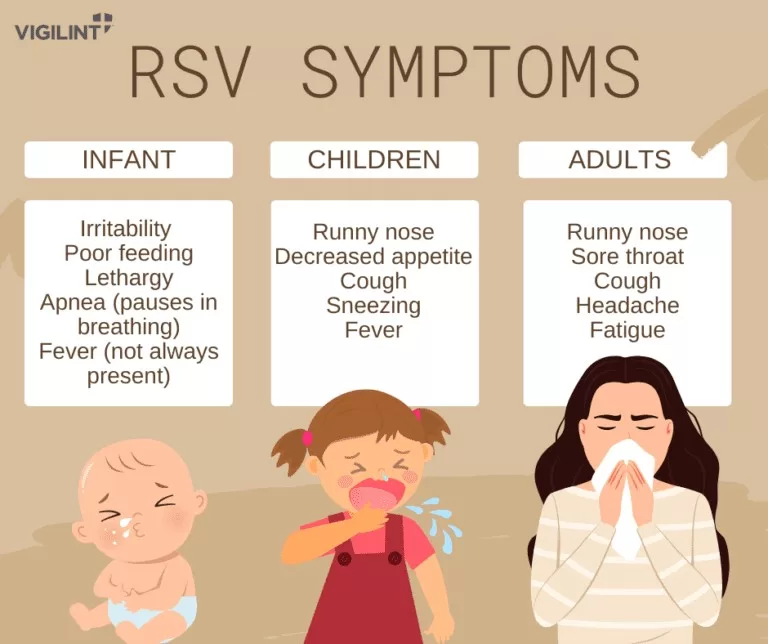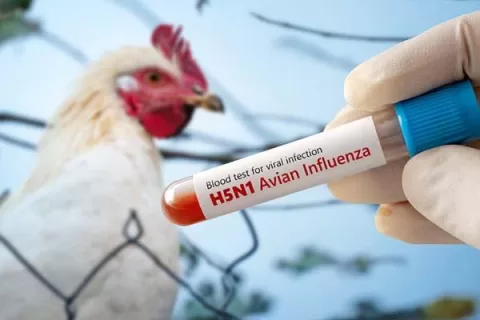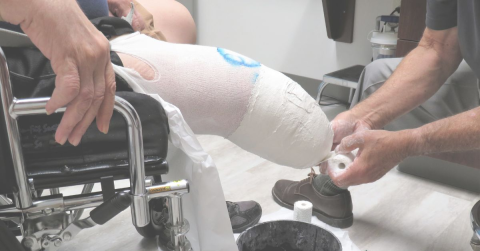Understanding RSV symptoms in adults and children is crucial, especially during the peak of respiratory virus season. Respiratory Syncytial Virus (RSV) typically presents with cold-like symptoms such as a runny nose, coughing, and fever. It can be difficult to distinguish these symptoms from other illnesses such as the flu or COVID-19, which makes awareness even more important. In children, RSV often affects their ability to communicate discomfort, making it vital for caregivers to recognize subtle signs. Complications from RSV can lead to severe health issues, underscoring the importance of timely RSV prevention and treatment.
Exploring the manifestations of Respiratory Syncytial Virus (RSV) in both adults and kids sheds light on respiratory health challenges during colder months. This viral infection, prevalent during the winter season, can resemble other respiratory conditions due to overlapping symptoms like sneezing and congestion. Additionally, understanding how RSV complications can escalate, particularly in vulnerable populations such as infants, further emphasizes the need for effective RSV treatment and preventative strategies. As we navigate this virus, being informed about how it affects different age groups becomes essential for ensuring timely medical responses.
Understanding RSV: What You Need to Know
Respiratory Syncytial Virus, commonly known as RSV, is a contagious virus that primarily affects the respiratory system. It typically manifests as a mild cold-like illness in healthy adults and children, but it can lead to more severe conditions like bronchitis and pneumonia, particularly in infants and older adults. Symptoms generally begin with a runny nose, coughing, and low-grade fever, making it challenging to differentiate from other respiratory infections. Recognizing these early RSV symptoms in adults and children is crucial for managing the illness effectively.
Despite the similarities in symptoms, RSV can present differently across age groups. In adults, symptoms may be relatively mild, but for infants, particularly those under six months, it can lead to severe respiratory distress. Many infants show subtle signs of irritability and decreased activity instead of the typical symptoms like fever and coughing. This variation underscores the need for awareness of RSV symptoms in both adults and children to ensure timely intervention and treatment.
RSV Symptoms in Adults and Children: A Closer Look
The symptoms of RSV can vary significantly between adults and children. In adults, common symptoms include nasal congestion, cough, and aches, which are often mild and can be mistaken for a common cold. On the other hand, children, especially infants, may show symptoms like wheezing, rapid breathing, and a bluish tint to the skin, indicating reduced oxygenation. This disparity emphasizes the importance of monitoring respiratory symptoms closely, particularly in young children who are at greater risk for severe RSV complications.
In severe cases among children, particularly those with underlying health issues, RSV can escalate quickly. Parents should be vigilant for signs such as difficulty breathing or unusual lethargy. If these symptoms arise, seeking medical help promptly is essential. For adults, while RSV symptoms may appear milder, those at higher risk due to age or health conditions should also be aware of the potential for complications, such as pneumonia or exacerbation of chronic respiratory diseases.
Preventive Measures Against RSV: Keeping Everyone Safe
Prevention of RSV infection begins with basic hygiene practices. The Centers for Disease Control and Prevention (CDC) emphasizes the importance of frequent hand washing with soap and water, especially after coughing or sneezing. Additionally, avoiding close contact with infected individuals can significantly reduce the risk of transmission. For parents, this means limiting interactions between babies and those showing cold symptoms, as babies are especially vulnerable to serious RSV complications.
Moreover, maintaining a clean environment can help curb the spread of the virus. Regularly disinfecting commonly touched surfaces, such as doorknobs and toys, is crucial in households with infants or those at higher risk of RSV infection. For young children, healthcare providers may recommend an RSV vaccine given to pregnant mothers or direct immunization for at-risk infants, helping to bolster their defenses against this potentially dangerous virus.
Effective Treatment Options for RSV: What to Consider
While there is no specific antiviral treatment for RSV in most cases, symptom management is vital. Health professionals recommend ensuring adequate hydration, using a cool mist humidifier to relieve congestion, and administering over-the-counter fever reducers when necessary. Parents should be cautious with medication, especially for infants, and consult healthcare providers to avoid any harmful interactions with existing medications or existing conditions.
In cases where severe symptoms develop, such as difficulty breathing or dehydration, hospitalization may be necessary. Treatments in a hospital setting can include supplemental oxygen, intravenous fluids, and in some cases, mechanical ventilation if the patient’s respiratory distress is significant. Understanding the appropriate responses to RSV symptoms is essential for ensuring effective treatment and reducing the risk of serious health complications.
Recognizing Severe RSV Symptoms: When to Seek Medical Help
Identifying the transition from mild RSV symptoms to severe manifestations is crucial for both adults and children. In adults, symptoms like persistent wheezing, extreme fatigue, and bluish skin can indicate the need for immediate medical attention. Similarly, in children, parents should watch for signs beyond typical cold-like symptoms, such as difficulty breathing, high fever, or irritability indicating distress. These signs necessitate urgent care to prevent potential complications from RSV.
Health experts recommend calling emergency services if you observe rapid breathing, bluish skin around the lips, or new chest pain in adults, while parents should act swiftly if their infant exhibits a significant change in behavior or respiratory difficulty. Early intervention can improve outcomes and reduce the incidence of severe RSV complications that might otherwise occur if symptoms are ignored.
The Impact of RSV on Infants: Understanding the Risks
RSV poses the greatest threat to infants, particularly those under two years of age. By the age of two, most children will have at least one RSV infection, making it crucial for parents to understand the signs and risks associated with this viral infection. Infants may not exhibit typical symptoms, leading to challenges in recognizing the severity of their condition. Symptoms like irritability and decreased activity can be subtle but warrant close monitoring, as they often hint at more serious respiratory difficulties.
High-risk infants, especially those born prematurely or with underlying health conditions, may experience severe respiratory illness that necessitates hospitalization. Parents should be aware that RSV can cause lasting effects, including the potential for recurrent wheezing and asthma in some cases. Understanding these risks is vital for parents and caregivers to safeguard their infants’ health and seek early medical advice when necessary.
Long-Term Effects of RSV: What Parents Should Know
While many children recover from RSV without lasting effects, some may experience long-term respiratory issues. Research suggests that RSV can increase the likelihood of asthma and other chronic respiratory diseases later in life. This occurrence highlights the need for ongoing monitoring of respiratory health in children who have had RSV. Parents should remain vigilant post-recovery, particularly if their child has a strong family history of asthma or allergies.
In addition to long-term respiratory implications, severe cases of RSV can sometimes lead to hospitalization, which carries its own risks. Children who have been hospitalized for RSV may experience subsequent respiratory complications, creating a cycle of health concerns. Therefore, it is essential for parents to maintain regular follow-up appointments with pediatricians to monitor their child’s lung health and address any emerging concerns from previous RSV infections.
RSV Awareness: Educating Families and Communities
Raising awareness about RSV is crucial for communities, especially during peak viral seasons. Education can empower families to recognize symptoms and take preventive measures more seriously. Schools, daycare centers, and community health organizations can play a significant role in disseminating information about RSV, emphasizing basic hygiene practices and recognizing early symptoms.
Community awareness initiatives can help ensure that families understand the importance of vaccinations and preventive treatments available for high-risk groups. Programs focusing on educating parents about RSV symptoms in both adults and children will contribute to a more informed public, ultimately reducing the incidence of severe RSV infections and complications within the community.
The Role of Healthcare Providers in RSV Management
Healthcare providers are pivotal in managing the impact of RSV on the community. Continuous education about prevention and treatment options can enhance patient outcomes significantly. Providers should encourage families to discuss any symptoms that may arise, ensuring that parents feel confident in seeking timely medical advice when necessary. This proactive engagement allows for better overall management of RSV within populations, particularly among at-risk individuals.
Moreover, healthcare providers play a critical role in advocating for vaccination efforts and ensuring that high-risk groups receive appropriate preventive care. Outreach programs that involve educating patients about RSV symptoms, treatment, and the importance of hygiene practices can foster a more robust healthcare environment, ultimately decreasing the prevalence of RSV complications and improving community health standards.
Frequently Asked Questions
What are the common RSV symptoms in adults and children?
Common RSV symptoms in both adults and children include runny nose, congestion, cough, sneezing, decrease in appetite, and fever. In adults, symptoms may also feature mild headaches and lack of energy, while children, especially infants, may show less noticeable signs such as irritability and trouble breathing. It’s important to monitor for severe symptoms like wheezing or rapid breathing, which can indicate a need for immediate medical attention.
How do RSV symptoms in children differ from adults?
While RSV symptoms in children and adults overlap, children, particularly infants, may not exhibit all common symptoms. Instead, young children may present with irritability and decreased activity levels, alongside typical symptoms like cough and congestion. Adults are more likely to show clear cold-like symptoms such as headaches and fatigue.
How long do RSV symptoms last in adults and children?
Symptoms of RSV generally last one to two weeks in both adults and children. However, those experiencing complications such as pneumonia may have prolonged illness. Monitoring severity is crucial, particularly in young infants and older adults.
What is the treatment for RSV symptoms in adults and children?
For RSV symptoms, treatment focuses on relieving mild symptoms, emphasizing hydration, rest, and possibly the use of OTC medications for fever. Severe cases may require hospitalization for oxygen support or IV fluids. Antiviral treatments are typically reserved for adults with weak immune systems, while antibiotics may only be prescribed if there is a secondary bacterial infection.
What preventative measures can be taken to avoid RSV symptoms?
Preventative measures against RSV symptoms include frequent hand washing, avoiding close contact with infected individuals, and maintaining cleanliness in living spaces. The CDC recommends specific vaccinations for infants and older adults to reduce the risk of severe RSV infection.
Can RSV lead to complications in adults and children?
Yes, RSV can lead to complications such as bronchiolitis and pneumonia in both adults and children. Adults, particularly those aged 65 and older, may face significant risks, and infants can experience severe respiratory issues that may be life-threatening.
Is RSV contagious and how is it spread?
Yes, RSV is contagious and spreads primarily through respiratory droplets from coughs or sneezes, direct contact with infectious surfaces, or close physical interactions. An infected person is most contagious in the first week of illness, but the virus can linger longer in infants.
Can adults and children receive an RSV vaccine?
Yes, there are RSV vaccines available for infants and older adults. For infants, an immunization is given, while adults aged 60 and older are approved for the newly available RSV vaccines. The CDC recommends vaccination as a key preventive step.
Are antibiotics effective against RSV symptoms?
No, antibiotics are not effective against RSV symptoms as RSV is a viral infection. They may only be prescribed if a bacterial infection arises alongside RSV, such as bacterial pneumonia.
What are severe RSV symptoms that require immediate medical attention?
Severe RSV symptoms include difficulty breathing, rapid breathing, a bluish tint to the skin, low energy levels, and confusion. If any of these symptoms occur, especially in infants or older adults, it is crucial to seek emergency medical help.
| Demographic | Common Symptoms | Severe Symptoms | Recommended Action |
|---|---|---|---|
| Adults | – Congestion – Cough – Fever – Lack of energy – Mild headache – Runny nose – Sore throat | – Extreme tiredness or weakness – Low appetite – Persistent cough – Wheezing – Shortness of breath – Bluish skin, lips, or nails – Sudden change in mental state | – Seek medical help if experiencing severe symptoms – Call 911 if trouble breathing, bluish lips, chest pain, or confusion occurs |
Summary
RSV symptoms in adults and children vary significantly, primarily due to their immune system differences and overall health conditions. In adults, RSV typically manifests as mild cold-like symptoms, while children, especially infants, may require closer monitoring, as their symptoms can be less pronounced but more dangerous. Understanding these differences can help caregivers and adults recognize RSV symptoms early, leading to prompt treatment and better health outcomes.
The content provided on this blog (e.g., symptom descriptions, health tips, or general advice) is for informational purposes only and is not a substitute for professional medical advice, diagnosis, or treatment. Always seek the guidance of your physician or other qualified healthcare provider with any questions you may have regarding a medical condition. Never disregard professional medical advice or delay seeking it because of something you have read on this website. If you believe you may have a medical emergency, call your doctor or emergency services immediately. Reliance on any information provided by this blog is solely at your own risk.







